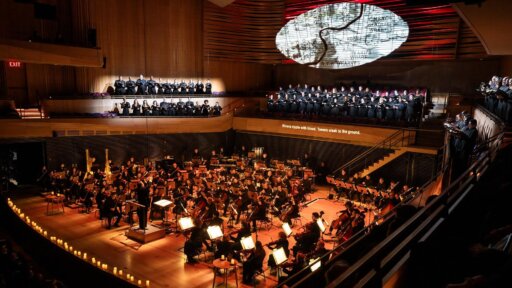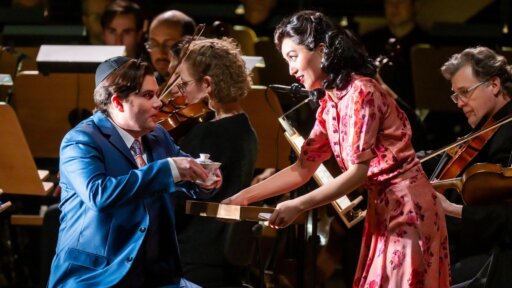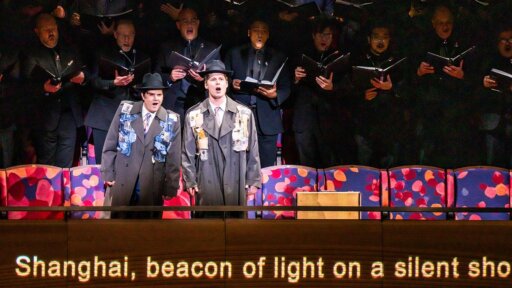TRANSCRIPT
♪♪ -Next, on "Great Performances"...
The U.S. premiere of a new musical drama tracing the odyssey of two Jewish brothers fleeing Nazi Germany, traveling across the globe to Shanghai, where there is refuge and hope for the future.
-♪ Josef, may I show you Shanghai?
♪ -A co-commission of the New York Philharmonic and the Shanghai Symphony Orchestra, "Emigré" features an international cast performing a score by Aaron Zigman, with a libretto by Grammy-winning lyricist Mark Campbell.
Shanghai Symphony Music Director Long Yu leads the New York Phil in a sweeping tale of love and loss.
"Emigré," a musical drama with the New York Phil, is next.
♪♪ Major funding for "Great Performances" is provided by... ...and by contributions to your PBS station from viewers like you.
Thank you.
[ Horn honking ] ♪♪ -In 1938, a rash of anti-Semitic violence spread throughout Europe, and an urgent wave of Jewish people fled persecution from the Nazi regime.
Immigrant quotas made it difficult to enter most countries, but Shanghai, China, was one of the rare exceptions, an open point of entry for immigrants.
-"Emigré" is a story of a miraculous time, where the government and the people of China harbored about 20,000 Jewish refugees from Eastern Europe.
-It is an amazing story, which in the history, myself is Shanghainese.
So, it's been a long time I want to bring the story to the public.
-China was not without its own strife and serious conflicts.
The 1937 Battle of Shanghai had resulted in Japanese occupation and led to the Nanjing Massacre and the murder of hundreds of thousands of Chinese.
-I never quite knew about this history, so it kind of gave me another layer of what was going on in China in the time.
-The actual story of the show is a romance between two brothers in the city.
One of the brothers that emigrates falls in love with a Chinese woman, and the other brother falls in love with a Jewish woman who's been an earlier wave of émigrés.
-It was first actually approached maybe to do an opera.
But then it kind of segued into an oratorial fairly quickly.
But I knew there needed to be of course a narrative.
And to me it made sense to make this a multicultural love story with subtle political themes going on, on the backdrop.
-I think the thing that's tricky is the piece is about migration and displacement.
And in a concert hall, you only have so many places you can go.
And so, there's actually a song in the piece called "Nowhere to Go," and it's ironic because there isn't a lot of room to move around.
But then you strategize, okay, where are the places, the alleyways and the arteries through the city that we can create?
-And during their stay in Shanghai, a lot of Jewish musicians joined the city life, to be the musicians in the orchestra, Shanghai Symphony Orchestra, which I'm music director of this orchestra.
If you see the history, during the wartime, it was 80% of the musicians were the Jewish musicians in the orchestra.
So, as musicians we have the duty that we'll bring something besides the classical music.
We also need to do something for our time, to do something for our life, also for all centuries.
-The import of the story is about citizens of the world protecting each other when our governments fail to do so.
-♪ Light a flame ♪ ♪♪ ♪♪ ♪♪ [ Applause ] ♪♪ [ Slow-tempo introduction plays ] ♪♪ ♪♪ ♪♪ ♪♪ ♪♪ ♪♪ ♪♪ ♪♪ ♪♪ ♪♪ ♪♪ ♪♪ ♪♪ ♪♪ ♪♪ ♪♪ ♪♪ ♪♪ ♪♪ ♪♪ ♪♪ ♪♪ ♪♪ ♪♪ ♪♪ ♪♪ ♪♪ ♪♪ ♪♪ [ Tempo quickens ] ♪♪ ♪♪ ♪♪ ♪♪ ♪♪ ♪♪ ♪♪ -♪ Look ahead, look ahead ♪ ♪ Look ahead, look ahead ♪ ♪♪ ♪ Look ahead, look ahead ♪ ♪ Look ahead, look ahead ♪ ♪♪ ♪♪ ♪♪ -♪ La-la, la-la-la la-la, la-la-la ♪ ♪ La-la-la-la, la-la-la-la-la-la ♪ ♪ La-la-la-la-la-la-la-la ♪ ♪ La-la, la-la-la la-la, la-la-la ♪ ♪ La-la-la-la, la-la-la-la-la-la ♪ ♪ La-la-la-la-la-la-la-la ♪ ♪ La-la, la-la-la la-la, la-la-la ♪ ♪ La-la-la-la, la-la-la-la-la-la ♪ ♪ La-la-la-la-la-la-la-la ♪ ♪♪ [ Applause ] ♪♪ ♪♪ ♪♪ ♪♪ ♪♪ ♪♪ ♪♪ ♪♪ -♪ And the world is one big house ♪ ♪♪ ♪♪ ♪♪ ♪♪ ♪♪ ♪♪ ♪♪ ♪♪ ♪♪ ♪♪ ♪♪ [ Tempo quickens ] ♪♪ ♪♪ ♪♪ ♪♪ ♪♪ ♪♪ ♪♪ ♪♪ ♪♪ ♪♪ ♪♪ ♪♪ ♪♪ ♪♪ [ Tempo slows ] ♪♪ ♪♪ ♪♪ ♪♪ ♪♪ ♪♪ ♪♪ [ Tempo quickens ] ♪♪ ♪♪ ♪♪ ♪♪ ♪♪ ♪♪ ♪♪ ♪♪ ♪♪ ♪♪ ♪♪ ♪♪ ♪♪ ♪♪ [ Tempo slows ] ♪♪ [ Tempo quickens ] ♪♪ ♪♪ ♪♪ ♪♪ ♪♪ ♪♪ ♪♪ ♪♪ ♪♪ ♪♪ ♪♪ ♪♪ ♪♪ [ Applause ] ♪♪ ♪♪ ♪♪ ♪♪ -Shoulan tongbao?
♪♪ ♪♪ [ Tempo quickens ] ♪♪ ♪♪ ♪♪ ♪♪ -♪ Here in a perfect world ♪ ♪♪ ♪♪ ♪♪ ♪♪ ♪♪ ♪♪ ♪♪ ♪♪ ♪♪ ♪♪ ♪♪ ♪♪ ♪♪ -♪ Brother... ♪ -♪ Father... ♪ ♪♪ ♪♪ [ Cheers and applause ] [ Up-tempo introduction plays ] ♪♪ ♪♪ ♪♪ [ Tempo slows ] ♪♪ ♪♪ ♪♪ ♪♪ ♪♪ ♪♪ ♪♪ ♪♪ ♪♪ ♪♪ ♪♪ ♪♪ ♪♪ ♪♪ ♪♪ ♪♪ [ Tempo quickens ] ♪♪ ♪♪ ♪♪ ♪♪ ♪♪ ♪♪ ♪♪ ♪♪ ♪♪ ♪♪ ♪♪ ♪♪ ♪♪ ♪♪ ♪♪ ♪♪ ♪♪ ♪♪ ♪♪ ♪♪ ♪♪ ♪♪ ♪♪ ♪♪ ♪♪ ♪♪ ♪♪ ♪♪ ♪♪ ♪♪ ♪♪ ♪♪ ♪♪ ♪♪ ♪♪ ♪♪ ♪♪ ♪♪ ♪♪ ♪♪ ♪♪ [ Applause ] ♪♪ [ Applause ] ♪♪ ♪♪ ♪♪ ♪♪ ♪♪ ♪♪ ♪♪ ♪♪ [ Applause ] ♪♪ ♪♪ ♪♪ ♪♪ ♪♪ -♪ Light a flame ♪ ♪ All of us must do the same ♪ ♪♪ ♪♪ ♪♪ ♪♪ ♪♪ [ Applause ] ♪♪ ♪♪ ♪♪ ♪♪ ♪♪ ♪♪ ♪♪ ♪♪ ♪♪ ♪♪ ♪♪ ♪♪ ♪♪ ♪♪ ♪♪ ♪♪ ♪♪ ♪♪ ♪♪ ♪♪ ♪♪ ♪♪ ♪♪ ♪♪ ♪♪ ♪♪ ♪♪ [ Cheers and applause ] -To find out more, visit pbs.org/greatperformances, find us on Facebook, and follow us on X.
[ Cheers and applause ] [ Cheers and applause ] [ Cheers and applause ] [ Cheers and applause ]









